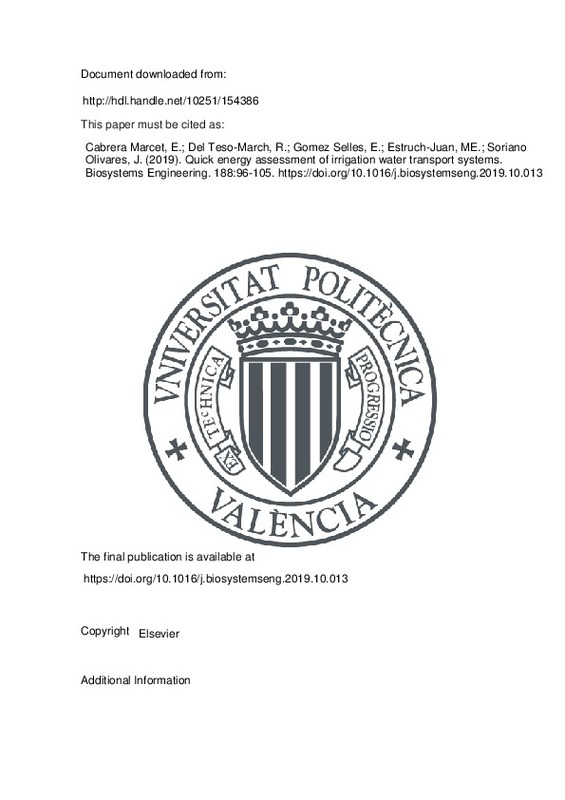JavaScript is disabled for your browser. Some features of this site may not work without it.
Buscar en RiuNet
Listar
Mi cuenta
Estadísticas
Ayuda RiuNet
Admin. UPV
Quick energy assessment of irrigation water transport systems
Mostrar el registro sencillo del ítem
Ficheros en el ítem
| dc.contributor.author | Cabrera Marcet, Enrique
|
es_ES |
| dc.contributor.author | Del Teso-March, Roberto
|
es_ES |
| dc.contributor.author | Gomez Selles, Elena
|
es_ES |
| dc.contributor.author | Estruch-Juan, María Elvira
|
es_ES |
| dc.contributor.author | Soriano Olivares, Javier
|
es_ES |
| dc.date.accessioned | 2020-11-07T04:32:31Z | |
| dc.date.available | 2020-11-07T04:32:31Z | |
| dc.date.issued | 2019-12 | es_ES |
| dc.identifier.issn | 1537-5110 | es_ES |
| dc.identifier.uri | http://hdl.handle.net/10251/154386 | |
| dc.description.abstract | [EN] Pressurised water transport systems are highly energy-intensive. Therefore, in the context of resource scarcity and climate change, efficiency is essential. To achieve this, it is necessary to (1) assess the state of the process and (2) evaluate the existing margin for potential improvement. These are the two objectives of this work, which is based on the energy intensity Ie (kW h m 3) of a process that can simultaneously be expressed in units of pressure. Considering water transport, and its incompressible behaviour, there exists a biunivocal relationship between Ie and the sum of energy required to transport water, which can be expressed as equivalent height H (m, energy per unit of mass). From the energy intensity (Ie) and energy requirements (H), the efficiency of a water transport system in operation is evaluated. From installations in the design phase, the range of Ie values that are needed to achieve efficiency can be predicted. The proposed procedure is general, simple and precise, as demonstrated through three case studies. | es_ES |
| dc.language | Inglés | es_ES |
| dc.publisher | Elsevier | es_ES |
| dc.relation.ispartof | Biosystems Engineering | es_ES |
| dc.rights | Reconocimiento - No comercial - Sin obra derivada (by-nc-nd) | es_ES |
| dc.subject | Energy intensity | es_ES |
| dc.subject | Energy assessment | es_ES |
| dc.subject | Water transport systems | es_ES |
| dc.subject | Diagnostic of water | es_ES |
| dc.subject | Distribution system | es_ES |
| dc.subject.classification | MECANICA DE FLUIDOS | es_ES |
| dc.subject.classification | INGENIERIA HIDRAULICA | es_ES |
| dc.title | Quick energy assessment of irrigation water transport systems | es_ES |
| dc.type | Artículo | es_ES |
| dc.identifier.doi | 10.1016/j.biosystemseng.2019.10.013 | es_ES |
| dc.rights.accessRights | Abierto | es_ES |
| dc.contributor.affiliation | Universitat Politècnica de València. Departamento de Ingeniería Hidráulica y Medio Ambiente - Departament d'Enginyeria Hidràulica i Medi Ambient | es_ES |
| dc.description.bibliographicCitation | Cabrera Marcet, E.; Del Teso-March, R.; Gomez Selles, E.; Estruch-Juan, ME.; Soriano Olivares, J. (2019). Quick energy assessment of irrigation water transport systems. Biosystems Engineering. 188:96-105. https://doi.org/10.1016/j.biosystemseng.2019.10.013 | es_ES |
| dc.description.accrualMethod | S | es_ES |
| dc.relation.publisherversion | https://doi.org/10.1016/j.biosystemseng.2019.10.013 | es_ES |
| dc.description.upvformatpinicio | 96 | es_ES |
| dc.description.upvformatpfin | 105 | es_ES |
| dc.type.version | info:eu-repo/semantics/publishedVersion | es_ES |
| dc.description.volume | 188 | es_ES |
| dc.relation.pasarela | S\396610 | es_ES |
| dc.subject.ods | 06.- Garantizar la disponibilidad y la gestión sostenible del agua y el saneamiento para todos | es_ES |







![[Cerrado]](/themes/UPV/images/candado.png)

